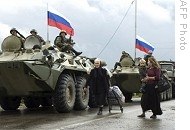-
(单词翻译:双击或拖选)
 |
| Column of Russian APCs moves along road near village of Rukhi at Inguri river, 08 Oct 2008 |
Until last week, few wanted to venture back into Ergneti, a small village in northeastern Georgia, caught in the midst of the war in early August and then part of a buffer zone under the control of Russian troops and their South Ossetian allies. But, the Russians have gone and Georgian families are coming back to their homes - Goderdzi Kasradze is one of them.
The men stand on the wide front porch, examining the damage: a mattress3 ripped and strewn on the floor, shattered glass, even a wooden window frame left dangling4. Goderdzi Kasradze looks on in dismay.
"The Russians destroyed my house and Ossetians looted it. They took everything we had," he said.
Nine family members call this home. They fled when the shooting and shelling started.
"The whole family was here when the shooting started. We evacuated5 the women and children. Then, I also had to flee," he explained.
They've just returned - to find this.
No room escaped damage. The children's bedroom - the living room. Kasradze's wife Lena tries a few keys on the once-prized piano. It too has been destroyed.
Whatever was left behind when the family fled was ransacked6 - even an old stove pipe ripped out of the ceiling to search for any hidden valuables. The family reacts with disbelief and despair.
PACE: What was your reaction when you came back here?
"I cry and that is my reaction," Kasradze responded.
The Kasradze home is just a kilometer from the dividing line with South Ossetia.
Until recently, the last checkpoint here was under Russian control, but now Georgian security forces have taken over. Across here is South Ossetia - its capital Tskhinvali less than two kilometers up the road. The soldiers say this is as far as we can go. It was events in Tskhinvali that sparked the fighting in August - when Georgian forces launched an attack to try to rein7 in Russian-backed separatists and regain8 control of the enclave. Russian forces moved in quickly, driving the Georgians back, pushing deep into Georgia and creating buffer zones around South Ossetia as well as the other breakaway region - Abkhazia in the northwest. Under a European Union-backed cease-fire accord Moscow promised to withdraw by October 10.
The Ergneti crossing is quiet - not much traffic either way - with the occasional exception. Ildizar Talibov slowly walks up the road toward the checkpoint. The soldiers quickly move to stop and query9 him. They let him pass.
Talibov says he regularly sold goods in the Tskhinvali market. He fell ill and was in the hospital when fighting broke out. He says he had to take shelter and could not leave until now.
"Tskhinvali is much destroyed," he said. "A friend who was in the hospital with me took me to his house. In those Georgian villages there is hardly any building left."
Thirty kilometers away - the Russians are still manning the Akhalgori checkpoint. They say they've received no orders so far to pull back any farther. A few hundred meters back is the Georgian checkpoint and on this occasion a European Union monitoring patrol has just stopped by.
"Do you know if there are any mines anywhere?" asks Fredrik Nylyn, part of an observer force sent here to monitor the cease-fire.
The Russians were to have moved back to pre-conflict positions on this day. There are differing views as to where those exact positions are and whether the Russians have fully10 complied.
"There is room for different interpretations11 on both sides, actually," noted12 Nylyn. "Yes, there will be different opinions on whether this agreement has been fulfilled from both parts or not."
The Russians have pulled out of their self-declared buffer zones, but they remain inside Abkhazia and South Ossetia.
But, back in Ergneti, Goderdzi Kasradze says there'll be no security until the Russians are really gone.
"We had fruits and flowers. It looked like people had lived here. It does not look like that now, but we hope we can change that and make it a home again," he said.
Making life normal again is what many Georgians hope, especially in these areas ravaged13 by fighting. Life is returning to normal, people are moving back to tend their orchards14 and farms and to rebuild. But for some, looking at their destroyed homes, it's hard to know just where to begin.
 收听单词发音
收听单词发音
1
warfare

|
|
| n.战争(状态);斗争;冲突 | |
参考例句: |
|
|
|
2
buffer

|
|
| n.起缓冲作用的人(或物),缓冲器;vt.缓冲 | |
参考例句: |
|
|
|
3
mattress

|
|
| n.床垫,床褥 | |
参考例句: |
|
|
|
4
dangling

|
|
| 悬吊着( dangle的现在分词 ); 摆动不定; 用某事物诱惑…; 吊胃口 | |
参考例句: |
|
|
|
5
evacuated

|
|
| 撤退者的 | |
参考例句: |
|
|
|
6
ransacked

|
|
| v.彻底搜查( ransack的过去式和过去分词 );抢劫,掠夺 | |
参考例句: |
|
|
|
7
rein

|
|
| n.疆绳,统治,支配;vt.以僵绳控制,统治 | |
参考例句: |
|
|
|
8
regain

|
|
| vt.重新获得,收复,恢复 | |
参考例句: |
|
|
|
9
query

|
|
| n.疑问,问号,质问;vt.询问,表示怀疑 | |
参考例句: |
|
|
|
10
fully

|
|
| adv.完全地,全部地,彻底地;充分地 | |
参考例句: |
|
|
|
11
interpretations

|
|
| n.解释( interpretation的名词复数 );表演;演绎;理解 | |
参考例句: |
|
|
|
12
noted

|
|
| adj.著名的,知名的 | |
参考例句: |
|
|
|
13
ravaged

|
|
| 毁坏( ravage的过去式和过去分词 ); 蹂躏; 劫掠; 抢劫 | |
参考例句: |
|
|
|
14
orchards

|
|
| (通常指围起来的)果园( orchard的名词复数 ) | |
参考例句: |
|
|
|















